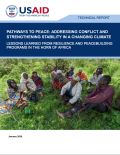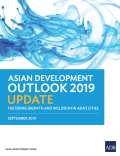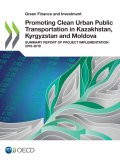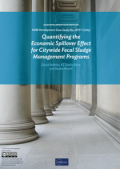The CDP Africa Report - Benchmarking progress towards climate safe cities, states, and regions provides a snapshot of carbon disclosures and associated standards in Africa.

This report critically assesses how peacebuilding programming can also produce adaptation benefits (and vice versa), so that interventions simultaneously contribute to reduced intercommunal conflict and strengthened resilience to a range of shocks and stresses, including droughts, floods, and rainfall variability.

Growth in developing Asia is moderating but remains robust. As global trade slows and investment weakens, regional growth forecasts are trimmed from Asian Development Outlook 2019 by 0.3 percentage points for 2019 and by 0.1 points for 2020 compared to April forecasts. Developing Asia is also urbanising rapidly, promising job creation and economic growth. As cities expand over municipal boundaries and become more connected with one another through flows of goods, services, and people, better planning coordination is needed at all levels of government. Realising their promise requires a holistic agenda for cities.

This report presents the objectives, methodology, procedures and main findings of the OECD project "Strengthening public finance capacity for green investments in the EECCA countries". Between 2016-19, the project aimed to help set the partner countries (Kazakhstan, Kyrgyzstan and Moldova) on a sustainable path of development by reducing the energy and carbon intensity of their economies.

This report introduces a model describing the full financial realities of fecal sludge management (FSM) projects; a methodology for quantifying the costs, direct effects, and economic spillover effects; and a toolkit to calculate their net present values and the overall program’s internal rates of return. This is demonstrated in the report through two citywide FSM programs in the Philippines. In both programs, economic spillover effects include improved tax revenues, property values, and health outcomes, and the present values of the direct effects and economic spillover effects exceed the original capital expenditure. This implies that when the policy makers set user charges to cover the recurrent costs such as operation and periodic maintenance, the FSM programs would be sustainable.
